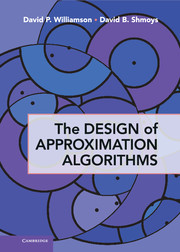Book contents
- Frontmatter
- Contents
- Preface
- I An Introduction to the Techniques
- II Further Uses of the Techniques
- 9 Further Uses of Greedy and Local Search Algorithms
- 10 Further Uses of Rounding Data and Dynamic Programming
- 11 Further Uses of Deterministic Rounding of Linear Programs
- 12 Further Uses of Random Sampling and Randomized Rounding of Linear Programs
- 13 Further Uses of Randomized Rounding of Semidefinite Programs
- 14 Further Uses of the Primal-Dual Method
- 15 Further Uses of Cuts and Metrics
- 16 Techniques in Proving the Hardness of Approximation
- 17 Open Problems
- Appendix A Linear Programming
- Appendix B NP-Completeness
- Bibliography
- Author Index
- Subject Index
14 - Further Uses of the Primal-Dual Method
from II - Further Uses of the Techniques
Published online by Cambridge University Press: 05 June 2012
- Frontmatter
- Contents
- Preface
- I An Introduction to the Techniques
- II Further Uses of the Techniques
- 9 Further Uses of Greedy and Local Search Algorithms
- 10 Further Uses of Rounding Data and Dynamic Programming
- 11 Further Uses of Deterministic Rounding of Linear Programs
- 12 Further Uses of Random Sampling and Randomized Rounding of Linear Programs
- 13 Further Uses of Randomized Rounding of Semidefinite Programs
- 14 Further Uses of the Primal-Dual Method
- 15 Further Uses of Cuts and Metrics
- 16 Techniques in Proving the Hardness of Approximation
- 17 Open Problems
- Appendix A Linear Programming
- Appendix B NP-Completeness
- Bibliography
- Author Index
- Subject Index
Summary
In this chapter, we give two somewhat more sophisticated applications of the standard primal-dual algorithm and analysis introduced in Chapter 7. We revisit the prize-collecting Steiner tree problem discussed in Sections 4.4 and 5.7, and give a primal-dual 2-approximation algorithm for it. We also revisit the feedback vertex set problem in undirected graphs introduced in Section 7.2, and give a primal-dual 2-approximation algorithm for this problem as well. In this case, we must give an alternative integer programming formulation for the problem since the previous formulation has an integrality gap that implies that the O(log n)-approximation algorithm of Section 7.2 is the best possible (within constant factors) using the formulation of that section.
The Prize-Collecting Steiner Tree Problem
In this section, we revisit the prize-collecting Steiner tree problem introduced in Section 4.4 and further discussed in Section 5.7. We show that a primal-dual algorithm can be used to give a 2-approximation algorithm for the problem; this improves on the performance guarantee of the previously given algorithms, and the primal-dual algorithm does not require solving a linear programming relaxation. Recall that in this problem we are given an undirected graph G = (V, E), edge costs ce ≥ 0 for all e ∈ E, a selected root vertex r ∈ V, and penalties πi ≥ 0 for all i ∈ V. The goal is to find a tree T that contains the root vertex r so as to minimize the cost of the edges in T plus the penalties of the vertices not in T; that is, ∑e∈Tce + ∑i∈V – V(T) πi, where V(T) is the set of vertices in the tree.
Information
- Type
- Chapter
- Information
- The Design of Approximation Algorithms , pp. 355 - 368Publisher: Cambridge University PressPrint publication year: 2011
